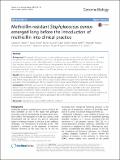Files in this item
Methicillin-resistant Staphylococcus aureus emerged long before the introduction of methicillin into clinical practice
Item metadata
| dc.contributor.author | Harkins, Catriona P. | |
| dc.contributor.author | Pichon, Bruno | |
| dc.contributor.author | Doumith, Michel | |
| dc.contributor.author | Parkhill, Julian | |
| dc.contributor.author | Westh, Henrik | |
| dc.contributor.author | Tomasz, Alexander | |
| dc.contributor.author | de Lencastre, Herminia | |
| dc.contributor.author | Bentley, Stephen D. | |
| dc.contributor.author | Kearns, Angela M. | |
| dc.contributor.author | Holden, Matthew T. G. | |
| dc.date.accessioned | 2017-07-24T10:30:12Z | |
| dc.date.available | 2017-07-24T10:30:12Z | |
| dc.date.issued | 2017-07-20 | |
| dc.identifier | 250558359 | |
| dc.identifier | bb85ca34-3bf9-4b92-b9e1-4f4eac5c20e2 | |
| dc.identifier | 28724393 | |
| dc.identifier | 85025080684 | |
| dc.identifier | 000405896900001 | |
| dc.identifier.citation | Harkins , C P , Pichon , B , Doumith , M , Parkhill , J , Westh , H , Tomasz , A , de Lencastre , H , Bentley , S D , Kearns , A M & Holden , M T G 2017 , ' Methicillin-resistant Staphylococcus aureus emerged long before the introduction of methicillin into clinical practice ' , Genome Biology , vol. 18 , 130 . https://doi.org/10.1186/s13059-017-1252-9 | en |
| dc.identifier.issn | 1465-6906 | |
| dc.identifier.other | ORCID: /0000-0002-4958-2166/work/60196441 | |
| dc.identifier.uri | https://hdl.handle.net/10023/11274 | |
| dc.description | SDB, JP and MTGH were supported by Wellcome Trust grant 098051. CPH was supported by Wellcome Trust grant number 104241/z/14/z. Bioinformatics and computational biology analyses were supported by the University of St Andrews Bioinformatics Unit, which is funded by a Wellcome Trust ISSF award (grant 097831/Z/11/Z). AK, MD and BP received funding from Public Health England. | en |
| dc.description.abstract | Background: The spread of drug-resistant bacterial pathogens poses a major threat to global health. It is widely recognised that the widespread use of antibiotics has generated selective pressures that have driven the emergence of resistant strains. Methicillin-resistant Staphylococcus aureus (MRSA) was first observed in 1960, less than one year after the introduction of this second generation beta-lactam antibiotic into clinical practice. Epidemiological evidence has always suggested that resistance arose around this period, when the mecA gene encoding methicillin resistance carried on an SCCmec element, was horizontally transferred to an intrinsically sensitive strain of S. aureus. Results : Whole genome sequencing a collection of the first MRSA isolates allows us to reconstruct the evolutionary history of the archetypal MRSA. We apply Bayesian phylogenetic reconstruction to infer the time point at which this early MRSA lineage arose and when SCCmec was acquired. MRSA emerged in the mid-1940s, following the acquisition of an ancestral type I SCCmec element, some 14 years before the first therapeutic use of methicillin. Conclusions : Methicillin use was not the original driving factor in the evolution of MRSA as previously thought. Rather it was the widespread use of first generation beta-lactams such as penicillin in the years prior to the introduction of methicillin, which selected for S. aureus strains carrying the mecA determinant. Crucially this highlights how new drugs, introduced to circumvent known resistance mechanisms, can be rendered ineffective by unrecognised adaptations in the bacterial population due to the historic selective landscape created by the widespread use of other antibiotics. | |
| dc.format.extent | 11 | |
| dc.format.extent | 1308351 | |
| dc.language.iso | eng | |
| dc.relation.ispartof | Genome Biology | en |
| dc.subject | Staphylococcus aureas | en |
| dc.subject | MRSA | en |
| dc.subject | Antibiotic resistance | en |
| dc.subject | RA0421 Public health. Hygiene. Preventive Medicine | en |
| dc.subject | QR Microbiology | en |
| dc.subject | QH426 Genetics | en |
| dc.subject | DAS | en |
| dc.subject | BDC | en |
| dc.subject | R2C | en |
| dc.subject | SDG 3 - Good Health and Well-being | en |
| dc.subject.lcc | RA0421 | en |
| dc.subject.lcc | QR | en |
| dc.subject.lcc | QH426 | en |
| dc.title | Methicillin-resistant Staphylococcus aureus emerged long before the introduction of methicillin into clinical practice | en |
| dc.type | Journal article | en |
| dc.contributor.sponsor | The Wellcome Trust | en |
| dc.contributor.institution | University of St Andrews. School of Medicine | en |
| dc.contributor.institution | University of St Andrews. Infection Group | en |
| dc.contributor.institution | University of St Andrews. Infection and Global Health Division | en |
| dc.contributor.institution | University of St Andrews. Biomedical Sciences Research Complex | en |
| dc.identifier.doi | 10.1186/s13059-017-1252-9 | |
| dc.description.status | Peer reviewed | en |
| dc.identifier.url | http://europepmc.org/articles/PMC5517843 | en |
| dc.identifier.grantnumber | 097831/z/11/z | en |
This item appears in the following Collection(s)
Items in the St Andrews Research Repository are protected by copyright, with all rights reserved, unless otherwise indicated.

